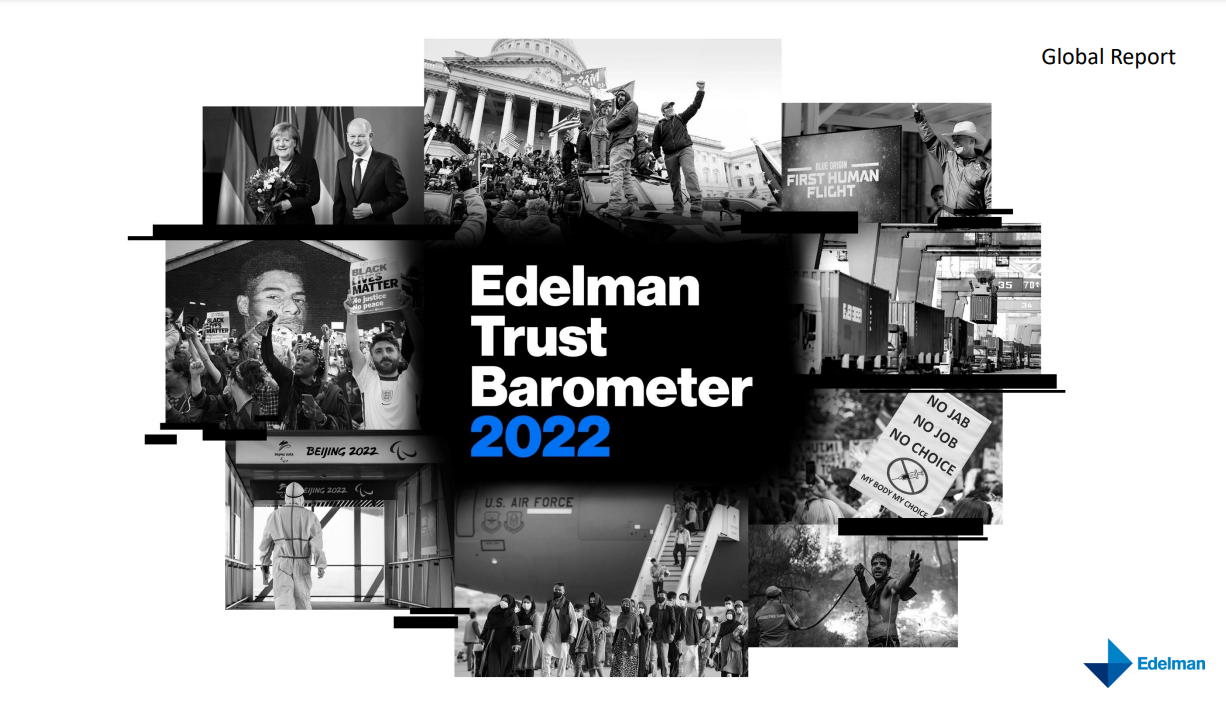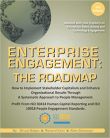Edelman Worldwide Trust Survey: People Place Best Hopes in Business to Address World Challenges
The Edelman 2022 Trust Barometer, which surveyed 36,000 people in 28 countries, finds that of all institutions people put their greatest faith in business to help solve societal problems, placing even more pressure on organizations to take action.
 Of the 10 major trends identified in this year’s Edelman trust survey, four involve business. No. 2 on the list: “Of the studied institutions, business is once again the most trusted. At 61%, business is the most trusted institution, even ahead of NGOs (non-governmental organizations) at 59%, government at 52% and media at only 50%. Surprisingly, 77% trust "my employer, making the relationship between employer and employee incredibly important.”
Of the 10 major trends identified in this year’s Edelman trust survey, four involve business. No. 2 on the list: “Of the studied institutions, business is once again the most trusted. At 61%, business is the most trusted institution, even ahead of NGOs (non-governmental organizations) at 59%, government at 52% and media at only 50%. Surprisingly, 77% trust "my employer, making the relationship between employer and employee incredibly important.”
No. 8 on the list is the need for business to address societal issues. “While business outscores government by 53 points on competency and 26 points on ethics, respondents believe business is not doing enough to address societal problems, including climate change (52%), economic inequality (49%), workforce reskilling (46%), and providing trustworthy information (42%).
No. 9 is the need for business to play a role in societal leadership. “When considering a job, 60% of employees want their CEO to speak out on controversial issues they care about and 80% of the general population want CEOs to be personally visible when discussing public policy with external stakeholders or work their company has done to benefit society. In particular, CEOs are expected to shape conversation and policy on jobs and the economy (76%), wage inequity (73%), technology and automation (74%).
Tenth on the list is the opportunity for business to “lead in breaking the cycle of distrust. Across every single issue, by a huge margin, people want more business engagement, not less. For example, on climate change, 52% say business is not doing enough, while only 9% say it is overstepping. The role and expectation for business has never been clearer, and business must recognize that its societal role is here to stay.”
Other key trends:
No. 1 is distrust. Nearly 6 in 10 say their default tendency is to distrust something until they see evidence it is trustworthy. Another 64% say it’s now to a point where people are incapable of having constructive and civil debates about issues they disagree on. When distrust is the default – we lack the ability to debate or collaborate.”
No. 3 is the role played by both the government and media in fueling a cycle of distrust. Nearly one out of every two respondents view government and media as divisive forces in society—48% and 46%, respectively. Furthermore, government leaders and journalists are seen as the least trusted societal leaders today, with less than half of respondents trusting either.
No. 4 is the failure of news sources to address the trust issue. “None of the major information sources are trusted as a source of general news and information, with trust in search engines at 59%, followed by traditional media at 57%, owned media at 43%, and social media at only 37%.”
No. 5 is concern about “fake news. Concerns over fake news or false information being used as a weapon is now at an all-time high of 76%.”
No. 6 is the “collapse of trust in democracies in many of the democracies studied. Institutions are trusted by less than half of their people, including by only 46% in Germany, 45% in Spain, 44% in the UK and 43% in the US.
No. 7. Societal fears are on the rise. “Without faith that our institutions will provide solutions or societal leadership, societal fears are becoming more acute. Most notably, 85% are worried about job loss and 75% worry about climate change.”
Master the “S” of Environmental, Social, Governance (ESG), A.k.a. Stakeholder Capitalism
The Enterprise Engagement Alliance at TheEEA.org is the world’s first and only organization that focuses on outreach, certification and training, and advisory services to help organizations achieve their goals by fostering the proactive involvement of all stakeholders. This includes customers, employees, distribution and supply chain partners, and communities, or anyone connected to an organization’s success.
Training and Thought Leadership
- Founded in 2008, the Enterprise Engagement Alliance provides outreach, learning and certification in Enterprise Engagement, an implementation process for the “S” or Social of Stakeholder Capitalism and Human Capital Management and measurement of engagement across the organization.
- The Enterprise Engagement Alliance provides a training and certification program for business leaders, practitioners, and solution providers, as well as executive briefings and human capital gap analyses for senior leaders.
- The EEA produces an education program for CFOs for the CFO.University training program on Human Capital Management.
- Join the EEA to become a leader in the implementation of the “S” of ESG and Stakeholder Capitalism.
- The ESM information portal and The Enterprise Engagement Advisors Network solution provider marketplace cover all aspects of stakeholder engagement, and the EEA information library lists dozens of resources.
- The RRN information portal and Brand Media Coalition marketplace address the use of brands for gifting, incentives, recognition, and promotions. The BMC information library provides information and research resources.
Video Learning
The EEA Human Capital Management and ROI of Engagement YouTube channel features a growing library of 30- to 60-minute panel discussions with leading experts in all areas of engagement and total rewards.
- Enterprise Engagement for CEOs: The Little Blue Book for People-Centric Capitalists. A quick guide for CEOs.
- Enterprise Engagement: The Roadmap 5th Edition implementation guide. A comprehensive textbook for practitioners, academics, and students.
Enterprise Engagement Advisory Services
The Engagement Agency helps:
- Organizations of all types develop strategic Stakeholder Capitalism and Enterprise Engagement processes and human capital management and reporting strategies; conduct human capital gap analyses; design and implement strategic human capital management and reporting plans that address DEI (Diversity, Equity, and Inclusion), and assist with managed outsourcing of engagement products and services.
- Human resources, sales and marketing solution providers profit from the emerging discipline of human capital management and ROI of engagement through training and marketing services.
- Investors make sense of human capital reporting by public companies.
- Buyers and sellers of companies in the engagement space or business owners or buyers who seek to account for human capital in their mergers and acquistions.
For more information: Contact Bruce Bolger at Bolger@TheICEE.org or call 914-591-7600, ext. 230.















